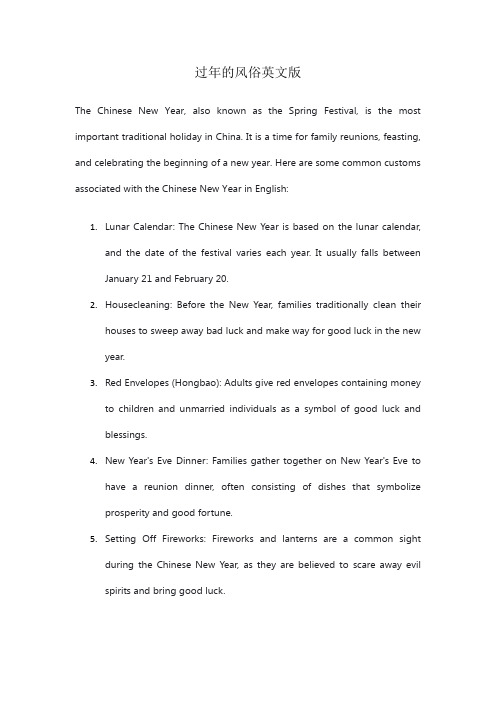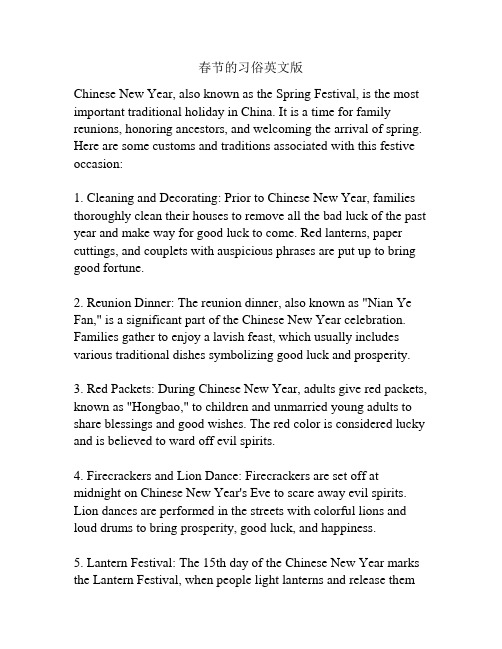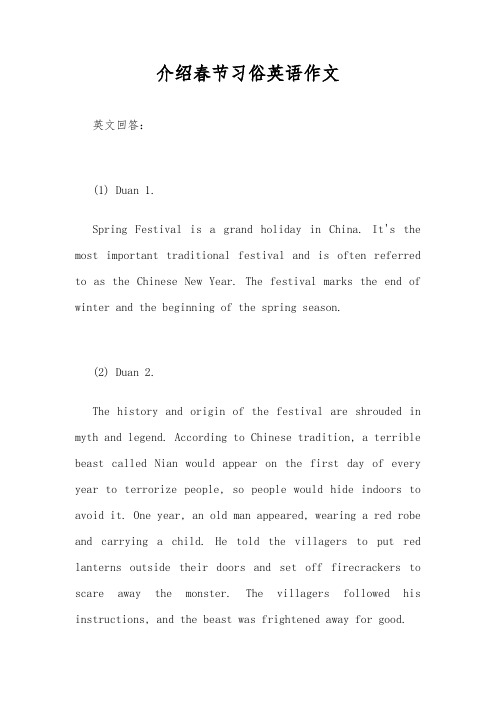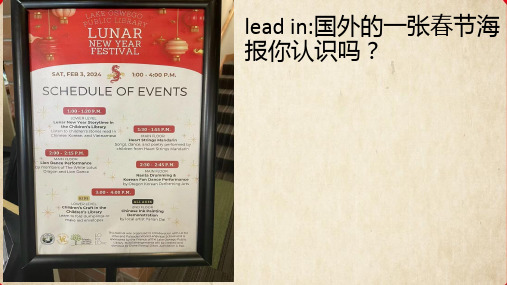春节习俗英文表达
过年的风俗英文版

过年的风俗英文版The Chinese New Year, also known as the Spring Festival, is the most important traditional holiday in China. It is a time for family reunions, feasting, and celebrating the beginning of a new year. Here are some common customs associated with the Chinese New Year in English:1.Lunar Calendar: The Chinese New Year is based on the lunar calendar,and the date of the festival varies each year. It usually falls between January 21 and February 20.2.Housecleaning: Before the New Year, families traditionally clean theirhouses to sweep away bad luck and make way for good luck in the new year.3.Red Envelopes (Hongbao): Adults give red envelopes containing moneyto children and unmarried individuals as a symbol of good luck and blessings.4.New Year's Eve Dinner: Families gather together on New Year's Eve tohave a reunion dinner, often consisting of dishes that symbolize prosperity and good fortune.5.Setting Off Fireworks: Fireworks and lanterns are a common sightduring the Chinese New Year, as they are believed to scare away evil spirits and bring good luck.6.Lion and Dragon Dances: Performances of lion and dragon dances are apopular way to celebrate the New Year, as they symbolize good luck and prosperity.7.Visiting Relatives and Friends: During the Chinese New Year, people visittheir relatives and friends, exchange greetings, and offer gifts such as oranges, which symbolize good luck.8.Temple Fairs: Many cities and towns hold temple fairs during theChinese New Year, where people can buy gifts, enjoy performances, and pray for good luck in the new year.These are just some of the many customs associated with the Chinese New Year. The festival is a time for joy, celebration, and reflection on the past year while looking forward to the future.。
春节的习俗英文版

春节的习俗英文版Chinese New Year, also known as the Spring Festival, is the most important traditional holiday in China. It is a time for family reunions, honoring ancestors, and welcoming the arrival of spring. Here are some customs and traditions associated with this festive occasion:1. Cleaning and Decorating: Prior to Chinese New Year, families thoroughly clean their houses to remove all the bad luck of the past year and make way for good luck to come. Red lanterns, paper cuttings, and couplets with auspicious phrases are put up to bring good fortune.2. Reunion Dinner: The reunion dinner, also known as "Nian Ye Fan," is a significant part of the Chinese New Year celebration. Families gather to enjoy a lavish feast, which usually includes various traditional dishes symbolizing good luck and prosperity.3. Red Packets: During Chinese New Year, adults give red packets, known as "Hongbao," to children and unmarried young adults to share blessings and good wishes. The red color is considered lucky and is believed to ward off evil spirits.4. Firecrackers and Lion Dance: Firecrackers are set off at midnight on Chinese New Year's Eve to scare away evil spirits. Lion dances are performed in the streets with colorful lions and loud drums to bring prosperity, good luck, and happiness.5. Lantern Festival: The 15th day of the Chinese New Year marks the Lantern Festival, when people light lanterns and release theminto the sky. It symbolizes the end of the New Year celebrations and the beginning of a new life.6. Dragon Dance: The dragon dance is a traditional performance during Chinese New Year, often seen in parades. It involves a team of performers holding up a long dragon-shaped costume and performing intricate movements to bring good luck and fortune.7. Sticky Rice Cake: The sticky rice cake, also known as "Nian Gao," is a traditional Chinese New Year food. It is made from glutinous rice and is believed to bring prosperity and progress in the coming year.8. Visiting Relatives and Friends: Chinese people visit their relatives and friends during the festival to exchange greetings and well-wishes. This is an opportunity to strengthen family bonds and maintain social connections.9. Temple Fairs: Temple fairs are held during Chinese New Year in many cities, offering various traditional cultural activities such as folk performances, traditional snacks, and handicrafts. It is a lively and festive atmosphere that attracts both locals and tourists.10. Lantern Riddle Guessing: Lantern riddle guessing is a popular game played during the Lantern Festival. Riddles are written on lanterns, and people have to guess the answers. It is a playful way to enhance intelligence and enjoy the festive spirit.These customs and traditions bring joy, luck, and blessings to millions of people celebrating the Chinese New Year. It is a timewhen families come together, honoring traditions and embracing new beginnings as they welcome the arrival of spring.。
春节习俗英文简介_春节习俗有哪些

春节习俗英文简介_春节习俗有哪些春节是我国最重要的传统节日之一,春节文化历史悠久,关于春节的习俗数不胜数。
店铺为大家介绍一下关于春节习俗的英语介绍,欢迎大家阅读。
中国春节的英文介绍Spring Festival is the most important holiday for Chinese people. Excitement and happiness are palpable this time of the year,and they reach the peak on lunar new year‘s eve.春节对于中国人来说是最重要的节日。
在每年的春节都让人兴高采烈,尤其是大年三十那晚,更是达到了高潮。
Though the 15-day period, which starts with the first day of the lunar new year and ends on the 15th day (known as Lantern Festival), is relatively long, it is the busiest time of the year for Chinese people. The arrangements they have to make for family reunions,buying necessities and preparing food keeps them busy throughout the holiday. Many of them travel back home and meet friends over dinner and drinks. The celebrations include decorating the house and setting off fireworks.春节历时15天,也就从大年初一开始,到元月十五元宵节结束。
介绍春节习俗英语作文

介绍春节习俗英语作文英文回答:(1) Duan 1.Spring Festival is a grand holiday in China. It's the most important traditional festival and is often referred to as the Chinese New Year. The festival marks the end of winter and the beginning of the spring season.(2) Duan 2.The history and origin of the festival are shrouded in myth and legend. According to Chinese tradition, a terrible beast called Nian would appear on the first day of every year to terrorize people, so people would hide indoors to avoid it. One year, an old man appeared, wearing a red robe and carrying a child. He told the villagers to put red lanterns outside their doors and set off firecrackers to scare away the monster. The villagers followed his instructions, and the beast was frightened away for good.(3) Duan 3.The Spring Festival is a public holiday in China, and it is celebrated over a period of 15 days. The festivities begin on the eve of the festival, with a family reunion dinner and the setting off of fireworks. On the first day of the festival, people visit their relatives and friends, exchange gifts, and enjoy a festive meal. The celebrations continue throughout the week, with various traditional activities, including lion and dragon dances, acrobatic shows, and the giving of red envelopes containing money.(4) Duan 4.The Spring Festival is a time for families to reunite and to celebrate the new year. It is also a time for reflection and renewal. The festival is a vibrant and colorful celebration that is full of joy and happiness. It is a time when people can come together and share the festive spirit.(5) Duan 5.The Spring Festival is a beautiful and meaningful holiday that is celebrated by people all over the world. It is a time to celebrate the Chinese culture and heritage, and it is a time to reflect on the past and to look forward to the future.中文回答:(1) 段落1春节是中国盛大的节日,它是最重要的传统节日,通常被称为中国新年。
春节习俗英文版ppt

春节习 俗
the Spring Festival customs and traditions
on New Year’s Eve
at/during Chinese/Lunar New Year at/during the Spring Festival
正月初三 the third day of
正月初四
大年初四,三羊开泰。灶王爷要查户口, 恭迎灶神回民间。相传大年初四灶王爷 要点查户口,所以家家户户都要守在家 里,因此也不宜远出,准备丰富的果品, 焚香点烛并施放鞭炮,以示恭迎。
Welcome the God of Kitchen
正月初五
• 按民间习俗是五路财神的生日,因此要 迎接财神进家,保佑自家新的一年财源 滚滚、年年有余,同时自然也是送走“穷” 的日子,故有“送穷出门”一说。同时, 这一天又俗称“破五”,意思是之前几天 的诸多禁忌至此就结束了。
收红包 get/receive lucky money/red envelopes
drumming 打鼓
舞扇子 fan dance
节 日 活 动
festival activities
正月初一 the first day of Chinese New Year
压岁钱 pocket money 正月初一是“鸡日”,原名“元旦”,“元”的本意为 “头”,后引申为“开始”。这一天是一年的头一天, 春季的头一天,正月的头一天,所以称为“三元”; 因为这一天还是岁之朝,月之朝,日之朝,所以又 称“三朝”;又因为它是第一个朔日,所以又称“元 朔”,正月初一还有上日、正朝、三朔、三始等别称, 意即年、月、日三者的开始。
农历正月初三,又称为“猪日”。自 秦汉以来,传统的看法是正月初一日 为鸡日(Rooster Day),初二日为狗日, 初三日为猪日,初四日为羊日,初五 日为牛日(Ox Day),初六日为马日,初 七日为人日(Human Day)。汉族民间传 说这是因为女娲创造万物生灵的时候, 先造的六畜,后造的人,因此初一到 初六都是六畜之日。因此人们习惯在 这一天里不杀猪,如果当日天气好, 则当年的猪会长得膘肥体壮,主人家 自然喜上眉梢。
春节传统习俗英文带翻译

The Spring Festival, also known as Chinese New Year, is the most important traditional festival in China. It is a time when families gather together to celebrate, and there are many traditional customs and practices associated with this holiday. In this article, we will explore some of the most common Spring Festival traditions and their significance.
In conclusion, the Spring Festival is a time of joy, celebration, and tradition for people in China and around the world. The customs and practices associated with this holiday are deeply rooted in Chinese culture and hold significant meaning for those who observe them. From red packets and family reunion dinners to lion dances and Spring Festival couplets, each tradition plays a special role in ushering in good fortune and prosperity for the coming year. These customs not only bring people together but also serve as a way to pass down the rich cultural heritage of the Chinese people to future generations. As we ring in the new year, let us embrace and cherish these time-honored traditions that make the Spring Festival so unique and meaningful.
关于中国春节的习俗英语表达句子
关于中国春节的习俗英语表达句子1. 告诉我关于中国的习俗的英语句子春节的:Spring Festival ,known as the Chinese New Year, is the most important holiday in China.From late January to early February,Chinese people are busy preparing for the New Year.They clean their houses ,have their hair cut,and buy new clothes .Jiaozi or dumpling is most popular.T o those who live far away from their home,this festival is also a framily reunion occasion.And they often go back home to celebrate the festival with their family.The first day of the new year is the time when people visit their friends adn wish each other good luck in the new year.春节,即中国人的新年,是中国最重要的节日。
从一月末到二月初人们忙着为新年做准备。
他们打扫房屋、理发和买新衣服。
饺子是最受欢迎的。
对那些远离家乡的人们,春节是一个合家团聚的时刻。
他们经常回家和家人欢度春节。
新年第一天人们访友并互祝新年好运。
清明节:Its Chinese name "Qing Ming" literally means "Clear Brightness," hinting at its importance as a celebration of Spring. Similar to the spring festivals of other cultures, Tomb Sweeping Day celebrates the rebirth of nature, while marking the beginning of the planting season and other outdoor activities.清明节,又叫踏青节,正是春光明媚草木吐绿的时节,也正是人们春游的好时候,所以古人有清明踏青,并开展一系列体育活动的的习俗。
春联、祭祖、团圆饭…用英文怎么说?春节习俗这样表达才地道!
春联、祭祖、团圆饭…⽤英⽂怎么说?春节习俗这样表达才地道!春节将⾄,都有哪些年味⼗⾜的传统习俗?这些习俗你都会⽤英⽂说吗?今天就和⼩e⼀起来学⼀学春节习俗的英⽂表达吧~贴春联Hang Spring Festival Couplets每逢春节,家家户户都要精选⼀幅⼤红春联贴在门的两边,颜⾊喜庆,寓意吉祥。
春联可以翻译为spring couplets,或者直接⾳译为chunlian也是没有问题的,只不过第⼀种译法相对于外国⼈来说更好理解⼀点。
春联是对联的⼀种,同样分为上联(the first line of a couplet)、下联(the second line of acouplet)以及横批(the top scroll)。
Spring Festival couplets consist of two paper scrolls, inscribed with auspicious sayings, pastedvertically on either side of the door. A shorter horizontal scroll is often pasted across the top.Like images of door gods, Spring Festival couplets were thought to protect the household fromevil.春联有上下两个卷轴,纸质,上⾯写着贺年的吉利字词,⼀般垂直贴于门的两侧。
横批较短,⽔平贴在门的顶端。
春联和门神画的作⽤类似,都被认为能驱邪避⿁、卫家宅、保平安。
舞龙舞狮Perform Dragon Dance and Lion Dance舞龙舞狮是个⾮常重要的中华⽂化遗产,每次过年的时候就⼀定会看到他们的踪迹。
这个习俗的英⽂翻译就很好理解啦。
The lion dance is one of the most important traditions at Chinese New Year. It is performed tobring prosperity and good luck for the upcoming year. The lion dance is also a way to create afestive atmosphere and bring happiness.舞狮是春节最重要的传统之⼀。
各种春节习俗的英文表达
各种春节习俗的英文表达01贴窗纸Paste window paperPeople in North China are used to posting paper-cut on their windows. When sticking the window decoration paper-cuts, people paste on the door large red Chinese character “fu”. A red "fu" means good luck and fortune, so it is customary to post "fu" on doors or walls on auspicious occasions such as wedding and festivals.在中国北方,人们习惯于在窗户上贴剪纸。
人们既在窗户上贴剪纸,又在大门上贴上大大的红色汉字“福”字,一个红色“福”字意味着好运和财富,因此习惯上在婚礼,节日之类的吉祥场合中,人们都会在门或墙上贴“福”字。
02贴春联 Post Spring Festival CoupletsDuring the Spring Festival,every family pastes the Spring Festival couplets on their doors to express sincere blessings and good wishes.春节期间,每家每户都在门口张贴春联以表达真诚美好的祝愿。
03熬夜(“守岁”) Stay up late or all nighton New Year's Eve"Shousui" means to stay up late or all night on New Year's Eve. After the great dinner, families sit together and chat happily to wait for the New Year’s arrival.守岁意味着除夕夜不睡觉。
英语词汇|春节习俗
英语词汇|春节习俗•春节 the Spring Festival•除夕 Chinese New Year's Eve•阳历 solar calendar•阴历 lunar calendar•正月 the first month of the lunar year•元宵节 the Lantern Festival•春运 Spring Festival travel season; Chunyun period•守岁 stay up for the New Year•欢度…… the celebration of...; celebrate...•买年货 do Spring Festival shopping; buy necessity for Spring Festival•大扫除 thoroughly clean the house•驱厄运 sweep away ill fortune; get rid of bad luck•去除灾难 ward off evils•扫尘土 sweep the dust•剪窗花 do paper-cutting•贴春联 stick couplets•挂灯笼 hang lanterns•财神 the god of wealth•年夜饭 the dinner on New Year's Eve•包饺子 make dumplings•年糕 rice cake•春卷 spring rolls•元宵 sweet dumplings•拜年 New Year's visit•压岁钱 gift money; lucky money•探亲访友 (pay a) visit (to) relatives and friends•亲朋好友 relatives and friends•发红包give money in red envelopes; hand out red envelopes•春节联欢晚会 Spring Festival Gala•祝福短信 blessing message•转运 have a change of luck•扭秧歌 do the Yangko Dance•舞龙 dragon dance•舞狮 lion dance•祭祖 offer sacrifices to one's ancestors •祭祀 sacrifice (v.)•烟花爆竹 fireworks and firecrackers •庙会 temple fair•民间艺人folk artist•京剧 Peking Opera•脸谱 facial makeup•木偶戏 puppet show•皮影戏 shadow play•杂技 acrobatics•相声 crosstalk•说书 story-telling•中国结 Chinese knot•刺绣 embroidery•剪纸 paper-cut•年画 New Year pictures•灯笼/花灯 (festival) lantern •灯谜 lantern riddle•民谣 folk song•民间故事 folk tale•传说 legend•丰富多彩 be rich and colorful •风俗习惯 custom•禁忌 taboo。
- 1、下载文档前请自行甄别文档内容的完整性,平台不提供额外的编辑、内容补充、找答案等附加服务。
- 2、"仅部分预览"的文档,不可在线预览部分如存在完整性等问题,可反馈申请退款(可完整预览的文档不适用该条件!)。
- 3、如文档侵犯您的权益,请联系客服反馈,我们会尽快为您处理(人工客服工作时间:9:00-18:30)。
Chinese New Year Celebration is the most important celebration of the year. Chinese people may celebrate the Chinese New Year in slightly different ways but their wishes are almost the same; they want their family members and friends to be healthy and lucky during next year. 春节庆祝活动是一年中最重要的庆祝活动。中国人庆祝春节的方式可能略微不同,但其愿望几乎是相同的,他们希望其家人和朋友来年健康和幸运。 Chinese New Year Celebration usually lasts for 15 days. Celebratory activities include Chinese New Feast, firecrackers, giving lucky money to children, the New Year bell ringing and Chinese New Year Greetings. Most of Chinese people will stop the celebrating in their home on the 7th day of New Year because the national holiday usually ends around that day, however celebrations in public areas can last until the 15th day of New Year. 春节庆祝活动通常持续15天。庆祝活动包括春节的年夜饭,放鞭炮,给儿童压岁钱,春节钟声和春节问候。大多数中国人将在春节的第7天停止庆祝活动,因为全国性节假通常在这一天结束,但在公共场所的庆祝活动可能最终持续到正月十五。 House Cleaning 房屋打扫 To clean houses on the New Year Eve is a very old custom dating back to thousands of years ago. The dust is traditionally associated with “old” so cleaning their houses and sweeping the dust mean to bid farewell to the “old” and usher in the “new”. Days before the New Year, Chinese families clean their houses, sweeping the floor, washing daily things, cleaning the spider webs and dredging the ditches. People do all these things happily in the hope of a good coming year. 春节打扫房屋这个非常古老的习俗甚至可以追溯到几千年前。灰尘在传统上与“旧”联系在一起,所以打扫房屋和扫除灰尘意味着辞“旧”迎“新”。春节的前几天,中国的各家各户都打扫房屋,扫地,清洗日用品,清除蛛网和疏浚沟渠。人们兴高采烈做所有这些事情,希望来年好运。 House decoration 房屋装饰 One of the house decorations is to post couplets on doors. On the Spring Festival couplets, good wishes are expressed. New Year couplets are usually posted in pairs as even numbers are associated with good luck and auspiciousness in Chinese culture. 房屋装饰之一就是在门上贴对联。在春联上,抒发良好的祝愿。春联通常是成对张贴,因为双数在中国文化中是好运气和吉祥的象征。 People in north China are used to posting paper-cut on their windows. When sticking the window decoration paper-cuts, people paste on the door large red Chinese character “fu” A red "fu" means good luck and fortune, so it is customary to post "fu" on doors or walls on auspicious occasions such as wedding, festivals. 在中国北方,人们习惯于在窗户上贴剪纸。人们既在窗户上贴剪纸,又在大门上贴上大大的红色汉字“福”字,一个红色“福”字意味着好运和财富,因此习惯上在婚礼,节日之类的吉祥场合中,人们都会在门或墙上贴“福”字。 Waiting for the First Bell Ringing of Chinese New Year 等待春节的第一声钟鸣 The first bell ringing is the symbol of Chinese New Year. Chinese people like to go to a large squares where there are huge bells are set up on New Year’s Eve. As the New Year approaches they count down and celebrate together. The people believe that the ringing of huge bell can drive all the bad luck away and bring the fortune to them. In recent years, some people have begun going to mountain temples to wait for the first ringing. Hanshan Temple in Suzhou, is very famous temple for its first ringing of the bell to herald Chinese New Year. Many foreigners now go to Hanshan Temple to celebrate Chinese New Year. 第一次钟声是春节的象征。中国人喜欢到一个大广场,那里有为除夕设置的大钟。随着春节的临近,他们开始倒计数并一起庆祝。人们相信了大钟的撞响可以驱除霉运,带来好运。近年来,有些人开始去山上寺庙等待第一次钟声。苏州的寒山寺就非常著名,它的钟声宣布春节的到来。现在有许多外国人也去寒山寺庆祝春节。 Staying up late ("Shousui") 熬夜(“守岁”) Shousui means to stay up late or all night on New Year's Eve. After the great dinner, families sit together and chat happily to wait for the New Year’s arrival. 守岁意味着除夕夜不睡觉。年夜饭后,家人聚坐一起,愉快聊天,等待春节的到来。 New Year Feast 年夜饭 Spring Festival is a time for family reunion. The New Year's Feast is "a must" banquet with all the family members getting together. The food eaten on the New Year Eve banquet varies according to regions. In south China, It is customary to eat "niangao" (New Year cake made of glutinous rice flour) because as a homophone, niangao means "higher and higher every year". In the north, a traditional dish for the feast is "Jiaozi" or dumplings shaped like a crescent moon. 春节是与家人团聚的时间。年夜饭是所有家庭成员聚在一起“必须”的宴会。除夕宴会上吃的食物根据不同的地区各不相同。在中国南方,习惯吃“年糕”(糯米粉制成的新年糕点),因为作为一个同音字,年糕意味着“步步高升”。在北方,年夜饭的传统饭是“饺子”或像月牙儿形的汤圆。 Setting Firecrackers 燃放鞭炮 Lighting Firecrackers used to be one of the most important customs in the Spring Festival celebration. However, concerning the danger and the negative noises that lighting firecrackers may bring, the government has banned this practice in many major cities. But people in small towns and rural areas still hold to this traditional celebration. Right as the clock strikes 12 o'clock midnight of New Year's Eve, cities and towns are lit up with the glitter from fireworks, and the sound can be deafening. Families stay up for this joyful moment and kids with firecrackers in one hand and a lighter in another cheerfully light their happiness in this especial occasion, even though they plug their ears. 放鞭炮曾是春节庆祝活动中最重要的习俗之一。然而,担心燃放鞭炮可能会带来危险和烦人的噪音,政府已在许多大城市下令禁止燃放鞭炮。但在小城镇和农村地区的人们仍然坚持这种传统的庆祝活动。除夕夜一旦时钟撞响午夜12点钟,城市和乡镇都被烟花的闪闪光芒映亮,鞭炮声震耳欲聋。一家人熬夜就为这个欢乐的时刻,孩子们一手拿鞭炮,一手拿火机兴高采烈地点放着他们在这个特殊节日的快乐,尽管他们吓得捂着耳朵。 New Year Greetings (Bai Nian) 春节的问候(拜年) On the first day of the New Year or shortly thereafter, everybody wears new clothes and greets relatives and friends with bows and Gongxi
